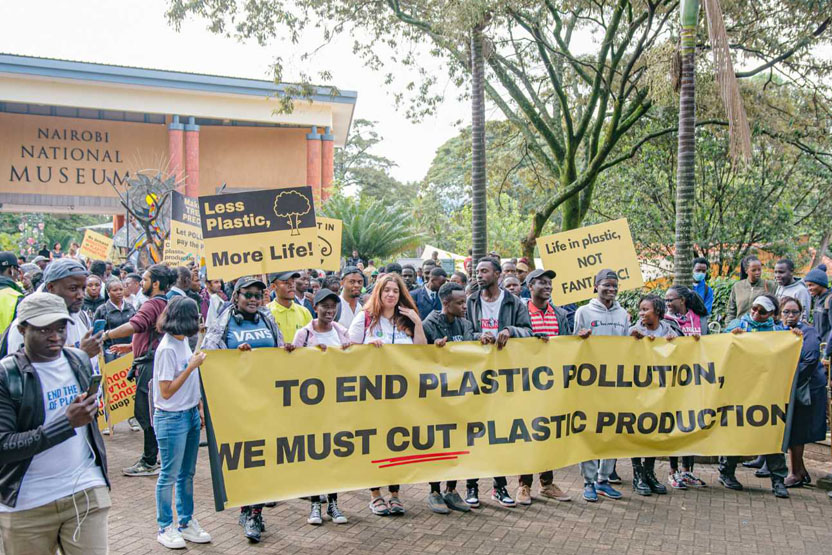
Greenpeace activists protest in Nairobi, Kenya 2023 and call on world leaders to conclude a strong and binding plastic treaty
A new report from Greenpeace UK reveals that the Global Plastics Treaty is under threat due to the lobbying and tactics of some of the world’s largest petrochemical companies.
The environmental and climate advocacy group warns that the fossil fuel industry has been systematically lobbying against plastic production cuts, all while reaping enormous profits from their growing operations in the sector.
According to the report, since treaty negotiations began in November 2022, just seven companies have produced enough plastic to fill 6.3 million garbage trucks—equivalent to five and a half trucks every minute.
The Center for International Environmental Law (CIEL) reports that 220 fossil fuel lobbyists attended the fifth round of treaty negotiations held in 2024 in Busan, South Korea, which ended without a final agreement.
This made fossil fuel lobbyists the largest single delegation at the talks, surpassing both the European Union and its member states combined, and outnumbering the Scientists’ Coalition for an Effective Plastics Treaty by a ratio of 3 to 1.
Since negotiations began, major companies including Dow, ExxonMobil, Chevron (U.S.), BASF (Germany), Philips (Netherlands), Shell (UK–Netherlands), SABIC (Saudi Arabia), and INEOS (UK) have increased their plastic production capacity by 1.4 million tons. Collectively, they sent 70 lobbyists to the negotiations—often also represented through powerful industry groups.
The report highlights that INEOS, the UK’s largest plastic producer, has increased its capacity by more than 20% and is investing £3.5 billion ($4.6 billion) in the "Project One" development in Antwerp, Belgium—set to become the largest plastic production facility in Europe.
Greenpeace states that it gave all companies mentioned in the report an opportunity to comment, but none responded.
According to the report, these companies have been working to weaken ambition in the treaty and divert attention to “false solutions” like chemical recycling, while blocking the possibility of a comprehensive agreement that tackles the plastic crisis at its root.
“Our research shows that those most harmed by regulation are the ones doing the most to block it,” said Anna Diski, co-author of the report and Senior Plastics Campaigner at Greenpeace. “We cannot allow the very companies profiting from plastic pollution to write the rules—otherwise, we’ll end up with a treaty that’s completely ineffective.”
Greenpeace and other international environmental organizations are calling for plastic pollution to be tackled at its source to protect both public health and the environment. They are urging governments to cut global plastic production by at least 75% by 2040.
They also stress the need for a just and inclusive transition to a low-carbon, zero-waste, circular economy, and insist the treaty must include a strong policy on conflicts of interest to prevent undue influence.
The report further calls for negotiations to prioritize those most affected by the plastic crisis and ensure meaningful participation of independent scientists, Indigenous peoples, local communities, and civil society groups—all of whom should have a seat at the table in shaping and implementing the treaty.


Comment